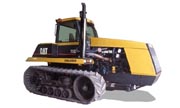
Challenger 75C Technical Specifications
Challenger 75C is a Row-Crop tractor that was produced by the John Deere between 1993 – 1995.
Below you will find detailed technical specifications for Challenger 75C covering engine types, horsepower ratings, weight, height, fuel type and tank volume, oil capacity and type, hydraulic system diagram, wiring diagram, battery specs, etc.
Challenger 75C Production
| Manufacturer: | |
| Manufacturer | Challenger (a part of Caterpillar) |
| Agricultural Crawler tractor | |
| Built in Peoria, Illinois, USA | |
| Original price was $134,500 in 1995 | |
| Engine: | 251.01 hp 187.2 kW |
| PTO (tested) | 301.85 hp 225.1 kW |
Challenger 75C Electrical
| Ground | negative |
| Charging system | alternator |
| Charging amps | 115 |
| Batteries | 2 |
| Battery CCA | 900 |
| Battery volts | 12 |
Challenger 75C Mechanical
| Drive | crawler |
| Power steering | |
| Hydraulic wet disc brakes | |
| Cab standard. | |
Capacity
| Fuel | 209 gal 791.1 L |
| Hydraulic system | 29 gal 109.8 L |
Hydraulics
| Type | closed center |
| Capacity | 29 gal 109.8 L |
| Pressure | 2550 psi 175.8 bar |
| Valves | 4 |
| Pump flow | 27 gpm 102.2 lpm |
| 35 gpmOptOptional 132.5 lpm | |
| Steering flow | 61.4 gpm 232.4 lpm |
| Steering press. | 6090 psi 419.9 bar |
Power Take-off (PTO)
| Rear RPM | 1000 |
Challenger 75C Engine detail
| Engine Detail | |
| Caterpillar 3176 ATAAC | |
| turbocharged diesel | |
| 6-cylinder | |
| liquid-cooled inline | |
| Displacement | 629 ci 10.3 L |
| Bore/Stroke | 4.92×5.5 inches 125 x 140 mm |
| Power (gross) | 325 hp 242.4 kW |
| Air cleaner | dual dry elements |
| Pre-heating | ether injection |
| block heater | |
| Compression | 16:1 |
| Rated RPM | 2100 |
| Starter | electric |
| Starter volts | 12 |
| Oil capacity | 31.7 qts 30.0 L |
| Coolant capacity | 60 qts 56.8 L |
| Engine Oil | |||
| Type | full power shift |
| Gears | 10 forward and 2 reverse |
| Oil capacity | 60 qts 56.8 L |
Challenger 75C Dimensions
| Wheelbase | 107.1 inches 272 cm |
| Length | 232 inches 589 cm |
| Width | 120 inches 304 cm |
| Height (cab) | 128 inches 325 cm |
| Height (exhaust) | 144 inches 365 cm |
| Operating weight | 33305 lbs 15107 kg |
| Clearance (drawbar) | 15 inches 38 cm |
| Gauge | 90 inches 228 cm |
Challenger 75C Tests
| OCED Tractor Test 1654 | |
| Diesel 10-speed crawler October 4 – 11, 1991 Link: OCED Tractor Test 1654 file | |
| PTO performance | |
| Max power | 301.85 hp 225.1 kW |
| Fuel use | 16.2 gal/hour 61.3 l/hour |
| Power at rated engine speed | 281.36 hp 209.8 kW |
| Fuel use | 15.6 gal/hour 59.0 l/hour |
| Power at rated PTO speed | 285.55 hp 212.9 kW |
| Fuel use | 15.7 gal/hour 59.4 l/hour |
| Drawbar performance | |
| Max power | 251.01 hp 187.2 kW |
| Fuel use | 15.7 gal/hour 59.4 l/hour |
| Gear 3 used for power test. | |
| Max pull | 34,309 lbs 15562 kg |
| Gear 1 used for pull test. | |
FAQ
Is Challenger 75C a good tractor?
The Challenger 75C is one of the great tractors in the Challenger (a part of Caterpillar) stable, and it has earned Challenger (a part of Caterpillar) a fantastic reputation.
How much oil does a Challenger 75C take?
Check out the Challenger 75C oil capacity and oil type in the engine specs section as it may vary across the engines. Keep in mind, that older models might have their oil capacity increased over time. You may compare between the early and late oil capacity.
Do tractors have VIN numbers?
Every tractor has a VIN number. The number is usually engraved below the driver’s seat. Tractor manufacturers put the number in different places on the tractor body.
What was the last year Challenger (a part of Caterpillar) made the 75C?
The Challenger 75C was an agricultural tractor model made from 1993 – 1995
How much horsepower is a Challenger 75C?
The 75C engine tested at 251.01 hp
187.2 kW drawbar and 301.85 hp
225.1 kW kW PTO horsepower.
How much does a Challenger 75C tractor weight?
Depending on the engine type, the Challenger 75C weight ranges from 33305 lbs
15107 kg .
How much can a Challenger 75C Pull?
The max pulling capacity of the Challenger 75C tractors starts at 34,309 lbs
15562 kg but may be slightly higher depending on the trim.
